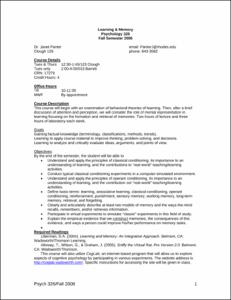Please use this identifier to cite or link to this item:
http://hdl.handle.net/10267/3585Full metadata record
| DC Field | Value | Language |
|---|---|---|
| dc.contributor.author | Panter, Janet | - |
| dc.date.accessioned | 2009-03-10T16:34:16Z | - |
| dc.date.available | 2009-03-10T16:34:16Z | - |
| dc.date.issued | 2006-08-29 | - |
| dc.identifier.uri | http://hdl.handle.net/10267/3585 | - |
| dc.description | This syllabus was submitted to the Office of Academic Affairs by the course instructor. | en_US |
| dc.description.abstract | Course Description This course will begin with an examination of behavioral theories of learning. Then, after a brief discussion of attention and perception, we will consider the role of mental representation in learning focusing on the formation and retrieval of memories. Two hours of lecture and three hours of laboratory each week. Goals Gaining factual knowledge (terminology, classifications, methods, trends). Learning to apply course material to improve thinking, problem-solving, and decisions. Learning to analyze and critically evaluate ideas, arguments, and points of view. Objectives: By the end of the semester, the student will be able to • Understand and apply the principles of classical conditioning, its importance to an understanding of learning, and the contributions to “real-world” teaching/learning activities. • Conduct typical classical conditioning experiments in a computer-simulated environment. • Understand and apply the principles of operant conditioning, its importance to an understanding of learning, and the contribution sot “real-world” teaching/learning activities. • Define basic terms: learning, associative learning, classical conditioning, operant conditioning, reinforcement, punishment, sensory memory, working memory, long-term memory, retrieval, and forgetting. • Clearly and articulately describe at least two models of memory and the ways the mind recalls, remembers, and/or retrieves information. • Participate in virtual experiments to simulate “classic” experiments in this field of study. • Explain the empirical evidence that we construct memories, the consequences of this evidence, and ways a person could improve his/her performance on memory tasks. | en_US |
| dc.language.iso | en_US | en_US |
| dc.publisher | Memphis, Tenn. : Rhodes College | en_US |
| dc.relation.ispartofseries | Syllabi CRN | en_US |
| dc.rights | Rhodes College owns the rights to the archival digital images in this repository. Images are made available for educational use only and may not be used for any non-educational or commercial purpose. Approved educational uses include private research and scholarship, teaching, and student projects. For additional information please contact archives@rhodes.edu. | - |
| dc.subject | Psychology, Department of | en_US |
| dc.subject | Syllabus | en_US |
| dc.subject | Curriculum | en_US |
| dc.subject | Academic departments | en_US |
| dc.subject | Text | en_US |
| dc.subject | 2006 Fall | en_US |
| dc.title | PSYC 326-01, Learning & Memory, Fall 2006 | en_US |
| dc.type | Syllabus | en_US |
| Appears in Collections: | Course Syllabi | |
Files in This Item:
| File | Description | Size | Format | |
|---|---|---|---|---|
| 2006_fall_PSYC_326-01.pdf | 60.26 kB | Adobe PDF |  View/Open |
Items in DSpace are protected by copyright, with all rights reserved, unless otherwise indicated.